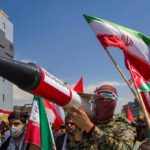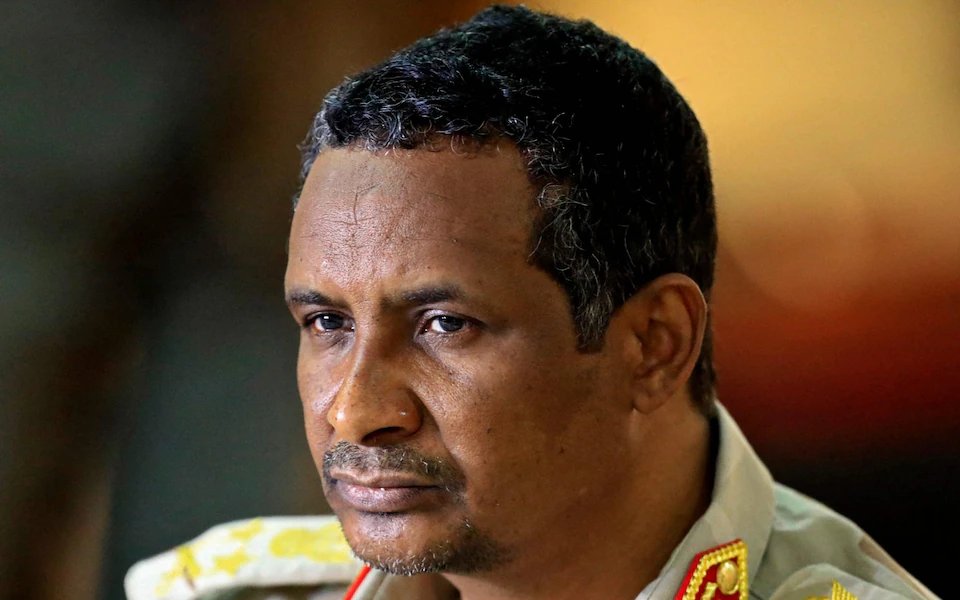With more than 50 civilians and many more military killed already in the power struggle between rival governing factions that erupted in Sudan over the weekend, there is no good side in this battle. But as with so many other conflicts in Africa and the Middle East in recent years, one thing we do know is that Russian troublemakers are not far from the action.
The fighting in Khartoum and elsewhere in the country was triggered by clashes between General Abdel Fattah al-Burhan, head of the Sudanese armed forces, and General Mohamed Hamdan Dagalo, or “Hemedti” for short. Burhan and Hemedti staged a coup in 2021, seizing power from the transitional council put in place following the ousting of the Islamist dictator Omar al-Bashir. Hemedti is commander of the Rapid Support Forces (RSF), a paramilitary group formed from the Janjaweed militias that helped conduct, under Bashir, the Darfur genocide, which is estimated to have killed hundreds of thousands of people in western Sudan.
Rather unsurprisingly, the RSF has been linked to Yevgeny Prigozhin’s Wagner Group, which has reportedly helped train and equip them. Wagner is believed to have been brought into Sudan by Bashir to help shore up his faltering regime in 2017, following a meeting with Putin in which Bashir promised to make the country Russia’s “key to Africa”. Among his plans was a Red Sea base for the Russian navy at Port Sudan, a Wagner-supported project.
Ever since, Wagner has supplied large quantities of weapons and equipment to Sudan, including military trucks, amphibious vehicles and two transport helicopters. And after the downfall of Bashir, the Russian mercenary group realigned with Burhan and especially Hemedti. It continues to operate the Meroe Gold company, which reportedly exploits Sudan’s mines and smuggles vast quantities of gold out of the country, supposedly lining Prigozhin’s pockets and denying much-needed revenue to Sudan. For Putin, this would help efforts to evade Western sanctions, allowing him to fuel his illegal war in Ukraine.
Now, the cash-rich and heavily-armed RSF could be about to wreak havoc on the North African region. Egypt’s President el-Sisi sees a stable regime in Khartoum as in his country’s vital interests. He will be looking askance at the capture on Saturday by the RSF of Egyptian troops in Sudan for joint exercises, even if Hemedti has assured their safe return at some point in the future. There will also be serious alarm in Cairo about the potential impact of this power struggle on the Grand Ethiopian Renaissance Dam project, for which Khartoum’s support is needed to address Egypt’s fears over water supply through the Nile.
Ultimately, this is such a major strategic issue that, should the conflict spiral out of control, Egypt may feel the need to assert itself more forcefully, as might Ethiopia.
Moreover, Chad, Eritrea and South Sudan could face a deluge of refugees, adding to their own internal struggles, and a power vacuum will enable extremist groups across the region to take advantage of what is happening. It was, after all, in Sudan that Osama bin Laden lived for five years, between 1991 and 1996. Opening up vast swathes of the desert for the next Bin Laden is something that would obviously undermine British and American security, too.
Thus, Vladimir Putin, either by accident or design, has helped to unleash a wave of violence that could have disastrous consequences not just for Sudan and North Africa, but the world. His failed invasion of Ukraine has empowered the Wagner Group, which uses that clout to plunder African nations and stir up trouble. His desperation for money since the West implemented severe sanctions has made Russian state support for such illicit actions a necessity. All this will come at a heavy price.
Indeed, Sudan may be just the first African nation to implode under Russian influence. In the Central African Republic, Mozambique, Libya and Mali, Russian mercenaries have worked to reinforce existing conflicts, prop up despotic regimes, suppress efforts towards democracy, loot natural resources, secure strategic advantage for Moscow and drive out Western influence. The forces unleashed by their efforts will not be easily contained.
Source: telegraph











Add Comment